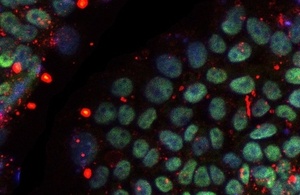Innovation: MHRA advises the Cell Therapy Catapult of regulatory requirements
MHRA advises the Cell Therapy Catapult on emerging clinical grade induced pluripotent stem cells bank regulation.

©Copyright the Cell Therapy Catapult Limited 2015. All rights reserved.
The issue
In 2012, the Cell Therapy Catapult was established by Innovate UK as a centre of excellence for innovation, with a view to developing a world-leading cell and gene therapy industry in the UK. Their mission is to drive the growth of the industry by helping cell and gene therapy organisations around the world to translate their early-stage research into commercially viable therapies.
One exciting new development is the advent of induced pluripotent stem cells (iPS) for use in new therapeutic products. iPS cells are developed by taking specialised adult dividing cells (eg skin cells) and ‘reprogramming’ them back to stem cells. These stem cells are considered to be ‘pluripotent’, meaning that they can be used to make any type of cell in the body.
In late 2013, the Cell Therapy Catapult partnered with Roslin Cells to establish a source of clinical grade iPS cells banked according to good manufacturing practice (GMP) in the UK, which can be used to accelerate the growth of the industry, specifically the progression of iPS based therapies into clinical trial.
It is expected that this emerging technology will significantly progress the sector in the UK, as unique challenges are overcome. For example, in scoping the project it became clear that important quality and regulatory issues would need to be expertly addressed in order to maximise the utility of the bank worldwide.
The Cell Therapy Catapult CEO, Keith Thompson, said:
Our focus is on growing the cell therapy industry in the UK, de-risking these ground-breaking ideas to enable therapies to advance to the clinic to benefit the nation’s health and wealth. MHRA’s expert advice provided an important regulatory milestone as part of our objective to ensure that our work is robust, credible and meets regulatory expectations for use in clinical application.
How MHRA helped
The Cell Therapy Catapult engaged with MHRA early on in the project to clarify the quality and regulatory requirements for the bank including:
- donor requirements – from healthy volunteer donors from outside the UK
- traceability – to ensure the bank meets the traceability requirements for advanced therapy medicinal products (ATMPs)
- manufacturing – guidance on sourcing materials, in-process and final product testing
- approach – potential pre-clinical and clinical testing requirements and discussion of the potential for utility of the bank worldwide
MHRA helped the Cell Therapy Catapult by:
- providing advice on the standard required for procurement of cells from outside the UK for use as a starting material for ATMPs which will meet European regulatory requirements
- reviewing global advice on iPS cell lines to provide pragmatic solutions to quality control issues such as suitable release strategy and stability programmes
- advising on suitable characterisation, preclinical and clinical testing for the iPS bank and products derived from this - this is particularly challenging for the developer as it requires raw materials and methods that are not part of conventional GMP processes
The outcome
A clinical trial is already taking place in Japan in this cutting-edge area. The effects of such work go beyond the traditional boundaries of medicine in that iPS cell-lines can be developed to provide cells for the treatment of many diseases, from cardiovascular indications to neurodegenerative disorders.
Working with MHRA, the Cell Therapy Catapult received guidance on the regulatory challenges in Europe, which in turn helped them to start positive discussions about this early-stage innovative technology with regulatory agencies in other territories. As safety and quality was at the forefront of their minds during the development of the project, MHRA’s advice and guidance on ensuring both a robust cell characterisation strategy and safety profile, has been welcomed.
This work has helped ensure that the clinical grade iPS bank is a robust, safe and innovative proposition that can be taken to additional territories and fit within global regulatory frameworks, with a view to tackling diseases that affect people around the globe.
The Unit Manager of Inspectorate Strategy and Innovation MHRA, Ian Rees, said:
This is an exciting area of cutting-edge science that promises to have huge public health benefits. Our expert regulatory advice makes sure that processes and practices achieve their goals, but in a safe and responsible way that is respected globally.
How we can help you
Contact the Innovation Office to find out more about accessing expert knowledge, guidance and experience that could help you develop ideas and save time and money. See our collection of case studies showing how we’ve helped other companies successfully navigate regulatory requirements.